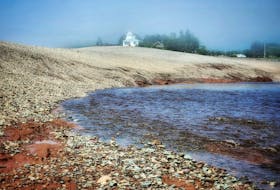The Nova Scotia Utility and Review Board has approved the application by Alton Gas for a construction extension on a controversial underground natural gas storage project.
“Opposition to the application centred on environmental issues and the adequacy of aboriginal consultation,” the board said in its decision to extend the construction permit first granted on Sept. 4, 2013, for five years, to September 2023.
The board’s approval explained that it does not have jurisdiction to address environmental issues related to construction and operation of the project.
The November application by the company, a subsidiary of AltaGas based in Calgary, precipitated more than 50 letters to the board raising environmental and consultation issues.
“With respect to aboriginal consultation, the adequacy of Crown consultation in relation to the project is currently being considered by the minister of environment in relation to the industrial approval of the project,” the board said, adding that the ministerial process is the most appropriate way to address the consultation issue.
Timeline muddied by the brackish

In January 2016, the provincial Environment Department issued an industrial approval for the operation of a brine storage pond and associated works at the Shubenacadie River estuary near Fort Ellis, Colchester County. The Sipekne’katik Band, with many of its members settled in nearby Indian Brook, appealed the minister’s decision. When the appeal was denied, the band successfully took its appeal to the Nova Scotia Supreme Court. The January 2017 written decision from the Supreme Court ordered the minister to release a new decision on the band’s original appeal but the minister is yet to do so.
The project is designed to draw nearly 10,000 cubic metres of water daily from the Shubenacadie River estuary near Fort Ellis and push it through a 12-kilometre underground pipeline to the cavern site off Brentwood Road, near Alton. There, the water will be pumped nearly 1,000 metres underground to flush out salt to create two caverns with a combined storage capacity of about four billion cubic feet of natural gas. The brine created by the salt dissolution will then be pumped back to the estuary for release into the river system, a gradual discharge of 1.3 million cubic metres of salt over a two- to three-year period.
Languishing years behind schedule on its project that would eventually have gas stored for distribution through the Maritime and Northeast Pipeline, the company recently applied for a court injunction to remove Mi’kmaq water protector Dale Andrew Poulette and others who have been living and protesting adjacent to the riverside brining site for several years.
The protesters say the influx of brine into the tidal river system will destroy fish and marine life but the company counters that the operation will be closely monitored to ensure no damage is done.
Poulette and Rachael Greenland-Smith, defended by environmental law firm Ecojustice, will appear in Supreme Court on Tuesday afternoon to oppose the injunction application.
“Dale Poulette and Rachael Greenland-Smith are protesting peacefully and effectively against an activity that they believe will harm the environment, which is their legal right,” Ecojustice lawyer James Gunvaldsen Klassen said in a release. “Dale has assumed a sacred duty to protect the Sipekne’katik River, and he takes this responsibility very seriously.”
Gunvaldsen Klassen said the project faces more stumbling blocks than Dale’s presence.
“At present, it would not be legal for Alton Gas to discharge the brine into the river under the (federal) Fisheries Act,” he said. “New regulations would have to be written and approved.”
The federal government announced recently that it was moving in to regulate the project and a spokeswoman for the federal Environment Department said it is developing federal regulations under the Fisheries Act to set controls for brine release.
Gunvaldsen Klassen said the consultation issue, too, has to be resolved.
The Treaty Beneficiary Association of the Mi’kmaw People held a news conference and treaty teach-in Monday at Saint Mary’s University to confirm their rights.
The association has given a notice of eviction to Alton Gas, saying Mi’kmaq rights holders have never given permission for the company to operate in their territory, and have voiced opposition to the project for many years, even occupying their lands at a ceremonial Treaty Camp and Truckhouse adjacent to the proposed brine discharge site.
RELATED:








